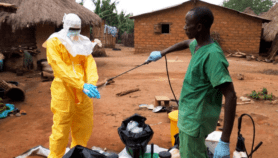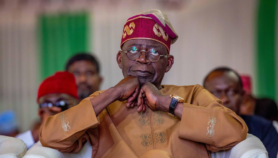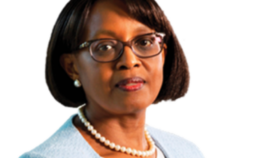17/03/22
Q&A: ‘Not easy for women to lead men’

By: Francis Kokutse
Send to a friend
The details you provide on this page will not be used to send unsolicited email, and will not be sold to a 3rd party. See privacy policy.
[ACCRA] The health systems of many African countries are led by male doctors, but one woman in Ghana has contributed to a change in this narrative.
Martha Gyansa-Lutterodt, Ghana’s first female chief pharmacist, is the first director of technical coordination in Ghana’s Ministry of Health.
Since her appointment as technical director in March 2019, she has been leading a team of doctors and other professionals to create and implement policies to address health challenges.
But Gyansa-Lutterodt says her path to the top is not without challenges.
“It is not easy as a woman to be leading men. But it is about knowing yourself and your own skills and it is also about making sure that nobody is belittled in the team,” says Gyansa-Lutterodt. “I have a home to keep, I have children to look after, but I have an office to keep as well.”
Rising through the ranks
Gyansa-Lutterodt graduated with a bachelor’s degree in pharmacy in 1987 from Ghana’s Kwame Nkrumah University of Science and Technology.
She worked as a pharmacist at the Tema General Hospital from 1989 to 1992 before becoming a municipal pharmacist at Tema Municipal Health Administration from 1995 to 2001.
“I have a home to keep, I have children to look after, but I have an office to keep as well.”
Martha Gyansa-Lutterodt, Ministry of health, Ghana
Gyansa-Lutterodt was appointed as the head of the Ghana National Drugs Programme (GNDP) in 2002 until she became Ghana’s first female pharmacist in 2010.
At the GNDP, among others, she led the publication of two editions of Ghana’s standard treatment guidelines and essential medicines list for all diseases.
As the chief pharmacist, Gyansa-Lutterodt championed several reforms at the Ministry of Health.
“I was the first chief pharmacist who led reforms to ensure that Ministry of Health had their own directors of pharmacy,” she tells SciDev.Net.
Shaping global health policies
Her work caught the attention of several organisations including the World Health Organization (WHO).
“I was also recognised by the WHO and appointed as an expert member of some of their committees, especially for drug management. In addition, my work has been recognised globally and in 2017 the UN appointed me as a member of the expert committee that looked at antimicrobial resistance and how it must be framed within the global space.”
As director for technical coordination in Ghana’s Ministry of Health, Gyansa-Lutterodt advises the minister for health on technical matters including pharmaceutical issues and policies, medical and dental matters and external health cooperation because Ghana collaborates with other countries in terms of human resource and bilateral arrangements.

She is a member of the Lancet Commission on Essential Medicines that examines the role of medicines in universal health coverage, to enable everyone to access health services without financial hardships.
“We are three from Africa – Ghana, Kenya and South Africa – and there are members from other countries,” she says. “The work of that committee is to re-frame pharmaceutical issues within the universal health coverage.”
The Lancet Commission’s work is to bridge the gaps and create the environment for developed and developing countries to address access to essential medicines as key to achieving universal health coverage.
Fighting antimicrobial resistance
Around 2017, the issue of antimicrobial resistance, she explains, became a glaring public health issue, and the WHO was at the forefront pushing the agenda that countries must create a global action plan in-country that can guide the process of implementation.
But it is not enough to have national plans, she explains: “We have to galvanise the world to do the things we wanted them to do with the action plans and that led to the inter-agency coordinating group that was formed by United Nations that has the co-chairs of the director-general of the WHO as well as the deputy secretary-general of the United Nations.”



She adds: “I was one of the conveners at the time and we worked for two years and submitted our report in 2019. I must say that it is the work I was leading in Ghana that led to my selection to serve on that panel.”
Mentoring younger generation
Gyansa-Lutterodt says that mentoring is key to achieving strategic goals.
“I believe that if a generation is not able to train other people after them, that generation is likely to go extinct,” she explains. That is why for me, I had learnt a lot from my seniors and my peers, and I have been determined to train other people, which I have done.”
This piece was produced by SciDev.Net’s Sub-Saharan Africa English desk.













